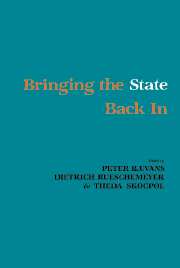Part I - States as Promoters of Economic Development and Social Redistribution
Published online by Cambridge University Press: 29 January 2010
Summary
Modern national states have taken on tasks ranging from war making to the provision of welfare services, and they have purposefully or unintentionally reshaped many aspects of their social surroundings. Yet interventions into economic processes have been the kind of state activities most fascinating to modern social scientists from Adam Smith to contemporary neo-Marxists. Again and again social scientists have asked how, and to what effect, states influence market and class relations at regional, national, and global levels.
All too often, however, discussions of “the state” in relation to “the economy” have been distracted from the difficult business of explaining historical and cross-national variations. This has happened in one or both of two ways. In the first place, much writing about the modern state has been normatively preoccupied with what it should or should not do – above all, what it should or should not do in or “to” the “free market.” When analytical rather than normative concerns have emerged, moreover, scholars have repeatedly resorted to very abstract theoretical models that derive transhistorical logics of state intervention, or abstention, from functional requisites of “the market” or of “capital accumulation.”
Nevertheless, some scholars have proceeded analytically rather than primarily normatively, and among those, some have examined the state's role in economic development in historically grounded ways, with sensitivity to various institutional forms and social effects. This kind of scholarship has focused especially on the contributions of states to the original capitalist industrialization of Europe and North America.
- Type
- Chapter
- Information
- Bringing the State Back In , pp. 39 - 43Publisher: Cambridge University PressPrint publication year: 1985



